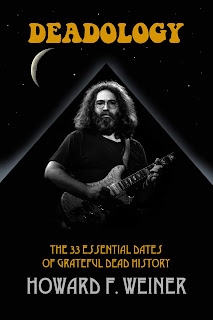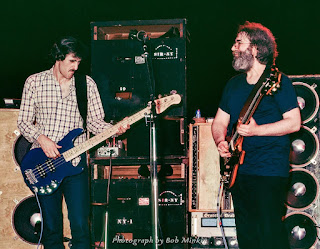On the 29th
anniversary of Brent’s death, here’s a
tribute that contains excerpts from
Deadology, and quick thoughts on some of his most memorable performances.
Brent’s Debut
 Brent
Mydland’s tenure as Grateful Dead keyboardist began in Spartan Stadium, San
Jose, on April 22, 1979. Brent was in Weir’s solo band, and he had two weeks of
studio practice with the Dead before his debut. Some Deadheads have identified
1977 as the year when the group began to pursue a more conventional arena rock
sound, although stamping these sonic crusaders with a label as banal as arena
rockers is absurd. But the music was transforming with the times, and a more
structured motif of Grateful Dead weirdness emerged.
Brent
Mydland’s tenure as Grateful Dead keyboardist began in Spartan Stadium, San
Jose, on April 22, 1979. Brent was in Weir’s solo band, and he had two weeks of
studio practice with the Dead before his debut. Some Deadheads have identified
1977 as the year when the group began to pursue a more conventional arena rock
sound, although stamping these sonic crusaders with a label as banal as arena
rockers is absurd. But the music was transforming with the times, and a more
structured motif of Grateful Dead weirdness emerged.
Mydland’s
Hammond B-3 organ and superb backing vocals energized the band. During his era,
there were minimal creative innovations for the Dead, and there was a limited
amount of new original songs compared to the abundance of new compositions from
the Keith era. Although, this had nothing to do with the change at keyboards.
With the help of John Perry Barlow, Mydland contributed seven new tunes to the
Dead’s last three studio efforts. However, Brent is best remembered for his
live contributions during his eleven-year run, which ended with a fatal drug
overdose on July 26, 1990.
The
Spartan Stadium show on 4-22-79 is a solid performance and extended workout as
the band introduced Brent to standard material. They played twenty-four songs,
four more than the average for the year. The biggest surprise of the night was the
double encore of “U.S. Blues” followed by a crisp performance of “Shakedown
Street.” The overall sound was more synthesized, but the rest of the band
seemed unaffected by the change, carrying on as if it were just another show.
Brent’s vocals and Hammond B-3 blended in effortlessly, although it took some
Keith fans years to get used to Brent, and some were never fond of his sound at
all.
After
opening set two with I Need a Miracle > Bertha > Good Lovin’, Scarlet
> Fire is the hottest performance from Brent’s debut. The “Scarlet” outro
fizzled prematurely into “Fire,” and it was here that Brent and Jerry bonded as
the intro jam materialized. Garcia boiled, bobbed, and weaved on the swishing,
cushioned mound of Brent’s organ sound. The mingling of the Mu-Tron III filter
and the Hammond B-3 added an extra dimension to one of the band’s great
rhythmic numbers.
Madison Square Garden 9-21-82
 The transition into
“Crazy Fingers” is magic, one of the coolest segues I’ve ever heard. These ’82
versions of “Crazy Fingers” are richer than the ’76 offerings, and Brent’s
keyboard is an important ingredient in that mix. This instrumental intro has an
abracadabra, sprinkling pixie dust aura. Garcia’s moved as he restates the
opening theme. Half of the Garden is cheering, the other half is breathless in
suspended anticipation. “Your rain falls like crazy fingers.” As Jerry lets
Hunter’s lyrics fly, Madison Square Garden is the happiest joint in the galaxy.
“Crazy Fingers” has all the ideal and idiosyncratic Grateful Dead ingredients:
evocative lyrics, a fleeting and hypnotic melody, and pure Jerry on guitar.
After Garcia’s melancholy between-verse solo, he starts singing the wrong word
for a split second, recovers, and delivers the remaining chorus as beautifully
as he’s ever sung. The almost blown lyric is a lovely mole on a gorgeous face.
The transition into
“Crazy Fingers” is magic, one of the coolest segues I’ve ever heard. These ’82
versions of “Crazy Fingers” are richer than the ’76 offerings, and Brent’s
keyboard is an important ingredient in that mix. This instrumental intro has an
abracadabra, sprinkling pixie dust aura. Garcia’s moved as he restates the
opening theme. Half of the Garden is cheering, the other half is breathless in
suspended anticipation. “Your rain falls like crazy fingers.” As Jerry lets
Hunter’s lyrics fly, Madison Square Garden is the happiest joint in the galaxy.
“Crazy Fingers” has all the ideal and idiosyncratic Grateful Dead ingredients:
evocative lyrics, a fleeting and hypnotic melody, and pure Jerry on guitar.
After Garcia’s melancholy between-verse solo, he starts singing the wrong word
for a split second, recovers, and delivers the remaining chorus as beautifully
as he’s ever sung. The almost blown lyric is a lovely mole on a gorgeous face.
The emotion in
Jerry’s voice on the last verse stops time in its tracks. “Midnight on a
carousel ride. Reaching for the gold ring down inside. Never could reach. It
just slips away but I try.” The outro solo rides the enchanted vibe and
virtuosity, and unexpectedly dashes into “Me and My Uncle,” the most-performed
Dead song of all time. “Uncle” never received a grander intro than it did on
this night.
10-12-84 Augusta, Maine
“Cold Rain and Snow”
and Lost Sailor > Saint of Circumstance provide an enticing start to set
two. The next revelation of listening to this show was Brent’s performance of
“Don’t Need Love” in the fourth spot. It’s an original written by Brent that
was played a handful of times between ’84 and ’86. I was disappointed by this
selection in the moment. After revisiting the tapes, I couldn’t get “Don’t Need
Love” out of my mind. The tune has a haunting, hypnotic groove, and it features
some heartfelt, bluesy singing by Brent. It’s a nice mood piece that could have
become a substantial song if some lyrics were added or if the band took time to
work on it.
3-29-90 Nassau Coliseum Eyes of the World
A euphoric buzz filled
the coliseum as Deadheads knew a young lion was on stage with the band.
Stepping into the first solo, Jerry’s sound is robust and spirited and at the
same time, intentionally subdued. As Branford plays in rhythm with the band,
Garcia’s solo shares the genetic makeup of “Eyes” with his musical brother.
Everything Branford needs to know is there: the emotions, colors, texture, and
temperature of the tune. All great improvisers are keen listeners. Although
Branford wasn’t familiar with “Eyes” when he stepped on stage, he absorbed the
professor’s lesson.
Without
any visual or verbal cues, Garcia steps off and Branford glides in at the 3:35
mark. The next 90 seconds comprise my favorite solo by anyone not named Jerry
Garcia. With the ease of Coltrane, Branford’s blowing and everyone in the
Nassau Coliseum is glowing. Branford’s connecting riffs and licks in a
rapturous vacuum à la Garcia in a
language that any Deadhead can relish.
After scaling crescendo
mountain, Deadheads roar and Jerry and Brent pick up the conversation. Jerry
throws out a lead, Branford answers, and Brent pounces on that cue. Brent’s at
his best here. This sublime give-and-take lasts ninety seconds, and there’s a
final blast of joy from Branford right before Jerry sings, “There comes a redeemer,
and he slowly too fades away.”
3-31-88 Fire on the Mountain Brendan Byrne
Arena
 This is an extraordinary Fire on the Mountain.
The Dead had a nice run of Fires in March 1988. Check out 3-16-88. The 3-31
Brendan Byrne Fire features a spectacular first solo from Jerry. Towards the
end of the solo, Jerry unleashes a lightning run, pauses, does it again with a
slight variation, and after another pause, lightning strikes a third time. In
solo two it's the Brent and Jerry show. Jerry starts a sentence and Brent
finishes his thoughts—an advanced call and response by two musical brothers who
had a special bond on stage. I could listen to the 3-31-88 Fire repeatedly
without ever getting bored.
This is an extraordinary Fire on the Mountain.
The Dead had a nice run of Fires in March 1988. Check out 3-16-88. The 3-31
Brendan Byrne Fire features a spectacular first solo from Jerry. Towards the
end of the solo, Jerry unleashes a lightning run, pauses, does it again with a
slight variation, and after another pause, lightning strikes a third time. In
solo two it's the Brent and Jerry show. Jerry starts a sentence and Brent
finishes his thoughts—an advanced call and response by two musical brothers who
had a special bond on stage. I could listen to the 3-31-88 Fire repeatedly
without ever getting bored.
9-24-82 Syracuse Far From Me
This is the night I discovered what a great
little tune Far From Me is. In Syracuse, it was an entertaining prelude to
Playing > Crazy Fingers to open set two. I loved Jerry’s backing vocals and
the tune always seemed to have an uplifting quality. And with the exception of
its first year, 1980, Far From Me was never overplayed.
6-29-84 Cuyahoga Falls Dear Mr. Fantasy
This is the second version of Dear Mr. Fantasy,
and as it materializes, it's a shared lead vocal between Jerry and Brant. Jerry’s
voice was sweet but a tad timid on this night. Jerry starts off the final verse
and when he hands it off to Brent, Mydland emphatically poured his soul into an
outrageous vocal, and Jerry responded with a stunning guitar solo. This was the
night Dear Mr. Fantasy became a Brent tune.
7-7-89 JFK Stadium Blow Away
Many Brent fans will point to this as Brent’s
greatest performance, and they’re right. Brent’s intensity is off the charts. This
is easily the best Blow Away. I may not love the improvised words in Brent’s
rap, but the performance is so powerful and emotional that he could have been
singing nonsensical lyrics and it wouldn’t have mattered. Jerry’s tasty and
perfectly placed licks enhance this minor masterpiece. Pure Brent. Chilling and
poignant!

















